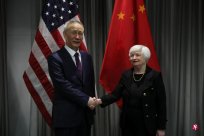The United States implements chip export control to China, which is precisely aware of China's highly dependent import chip to develop merchant and military products.Faced with the American congestion, China began to seek dependence on imported chips.
(Davos Bloomberg) revealed that the two major semiconductor equipment manufacturing countries, the Netherlands and Japan, may first agree to participate in the United States' chips to the United States at the end of this month and finalize the technical export measures for China.
Japanese Prime Minister Kishita Tianshiong and the Dutch Prime Minister Lutter have discussed their respective plans with US President Biden in the White House this month.
Lutal on Thursday (January 19) in an interview between the World Economic Forum in Davos, Switzerland, saying that "quite confident" can reach an agreement.
The Bayeng government announced in October last year that the export control measures for Chinese chip exports are not only restricted to the export of chip manufacturing equipment made in the United States to China, but also banned American citizens from working for Chinese chip manufacturers.It is expected that the export restrictions on China to China will not be as wide as the United States. Even so, once the United States and the Japanese lotus join forces, Beijing may fall into a more isolated situation in obtaining the technology or talents required for the most advanced semiconductor.
The world's major chip equipment manufacturing companies, the United States accounts for the largest proportion; the production of ASML Holdings NV is almost an indispensable light carvings in chip manufacturing; Tokyo Electron, Tokyo, Japan is the fourth world in the worldMost semi -conductive equipment manufacturers.
Analysis: If it is not obtained, it is difficult for China to make the most advanced chip
Analysts pointed out that if the products of the above companies cannot be obtained, Chinese manufacturers will almost be unlikely to form a production line to create the most advanced chip.
Bloomberg will join the United States in Japan and the Netherlands to limit the export of technology to China and ask a spokesman for the White House National Security Council, but the other party will not comment.
Semiconductor has become a major battlefield for the strategic game of China and the United States.The United States is the inventor and the largest supply of chip technology, and China is the world's largest chip market.The United States' implementation of chip export control to China is precisely aware of China's high dependence on imported chips to develop commercial and military products.Faced with the American congestion, China began to seek dependence on imported chips.
For Biden, to win Japan and the Netherlands standing on the same front, it will strengthen the intensity and effectiveness of the surrounding of China.For the Japanese and loads, they must make a measurement and choice between geopolitical considerations and losing China's huge market.
The Chairman of the US House of Representatives of the US House of Representatives and the Republican Republic of Texas, Maccol, issued a statement saying: "Praise the Bayeng government to cooperate with partnerships to implement export control on the equipment for high -end semiconductors."He said he would closely pay close attention to the details of the negotiations between the United States and Japan.
Dutch Prime Minister Lutter said in an interview that even if he talked about the results, "there may not be a high -profile announcement."
After the U.S. government announced its control measures, some chip manufacturers in the United States warned investors that they may lose billions of US dollars from China, and if overseas colleagues can continue to trade chip transactions with China without restrictions, then the United StatesManufacturers may lose market share.
Tokyo Electronics said its business has been affected by Chinese customers.ASML said that its products also have demand in markets outside China, which is enough to make up for the gap in Chinese revenue.


